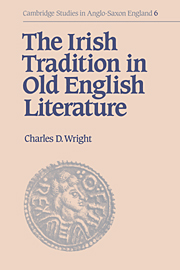Book contents
- Frontmatter
- Contents
- Acknowledgements
- List of abbreviations
- 1 Introduction
- 2 The ‘enumerative style’ in Ireland and Anglo-Saxon England
- 3 The Visio S. Pauli and the Insular vision of hell
- 4 Apocryphal cosmology and Celtic myth in ‘The Devil's Account of the Next World’
- 5 The literary milieu of Vercelli IX and the Irish tradition in Old English literature
- Appendix: Vercelli Homily IX and ‘The Devil's Account of the Next World’
- Bibliography
- Index
5 - The literary milieu of Vercelli IX and the Irish tradition in Old English literature
Published online by Cambridge University Press: 18 March 2010
- Frontmatter
- Contents
- Acknowledgements
- List of abbreviations
- 1 Introduction
- 2 The ‘enumerative style’ in Ireland and Anglo-Saxon England
- 3 The Visio S. Pauli and the Insular vision of hell
- 4 Apocryphal cosmology and Celtic myth in ‘The Devil's Account of the Next World’
- 5 The literary milieu of Vercelli IX and the Irish tradition in Old English literature
- Appendix: Vercelli Homily IX and ‘The Devil's Account of the Next World’
- Bibliography
- Index
Summary
In its indebtedness to Irish sources and literary models, Vercelli IX is by no means unique or isolated. Several of the Old English texts which I shall discuss in this chapter also have an enumerative structure or employ numerical rhetoric, and many incorporate eschatological and cosmological motifs paralleled in Irish sources. A few share specific stylistic and thematic features with Vercelli IX and may be regarded as products of an Irish-influenced literary milieu. The stylistic affinities between Vercelli IX and the Prose Solomon and Saturn Pater Noster Dialogue, in particular, are sufficiently striking to attribute these two texts to a common workshop.
Three prominent eschatological themes in anonymous Old English homilies are based on apocryphal traditions transmitted by the Irish: the Three Utterances of the Soul, the Seven Heavens apocryphon and the ‘Niall’ version of the Sunday Letter. The Three Utterances exemplum, which tells of the exclamations of a good and a bad soul to the angels or demons who lead them to heaven or hell at the moment of death, was adapted independently by three Anglo-Saxon homilists. Versions of this exemplum survive in an Old English Rogationtide homily in Oxford, Bodleian Library, Hatton 114 (Worcester, s. xi), 102V–105V; in a sermon Be heofonivarum 7 be helwarum in London, BL, Cotton Faustina A. ix (s. xii1), 21v–23v, and Cambridge, Corpus Christi College 302 (s. xi/xii), pp. 71–3; and in a Lenten homily in Oxford, Bodleian Library, Junius 85/86 (s. ximed; provenance St Augustine's, Canterbury?), 25r–40r.
- Type
- Chapter
- Information
- The Irish Tradition in Old English Literature , pp. 215 - 272Publisher: Cambridge University PressPrint publication year: 1993



